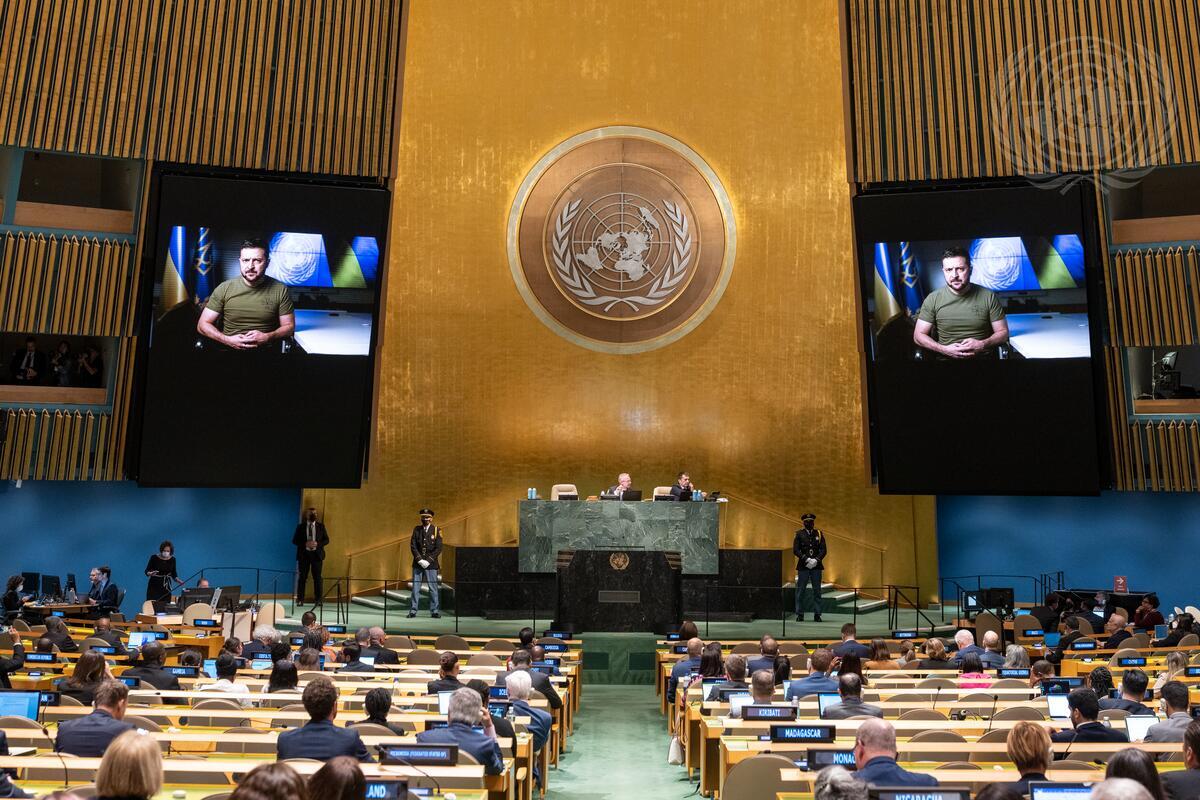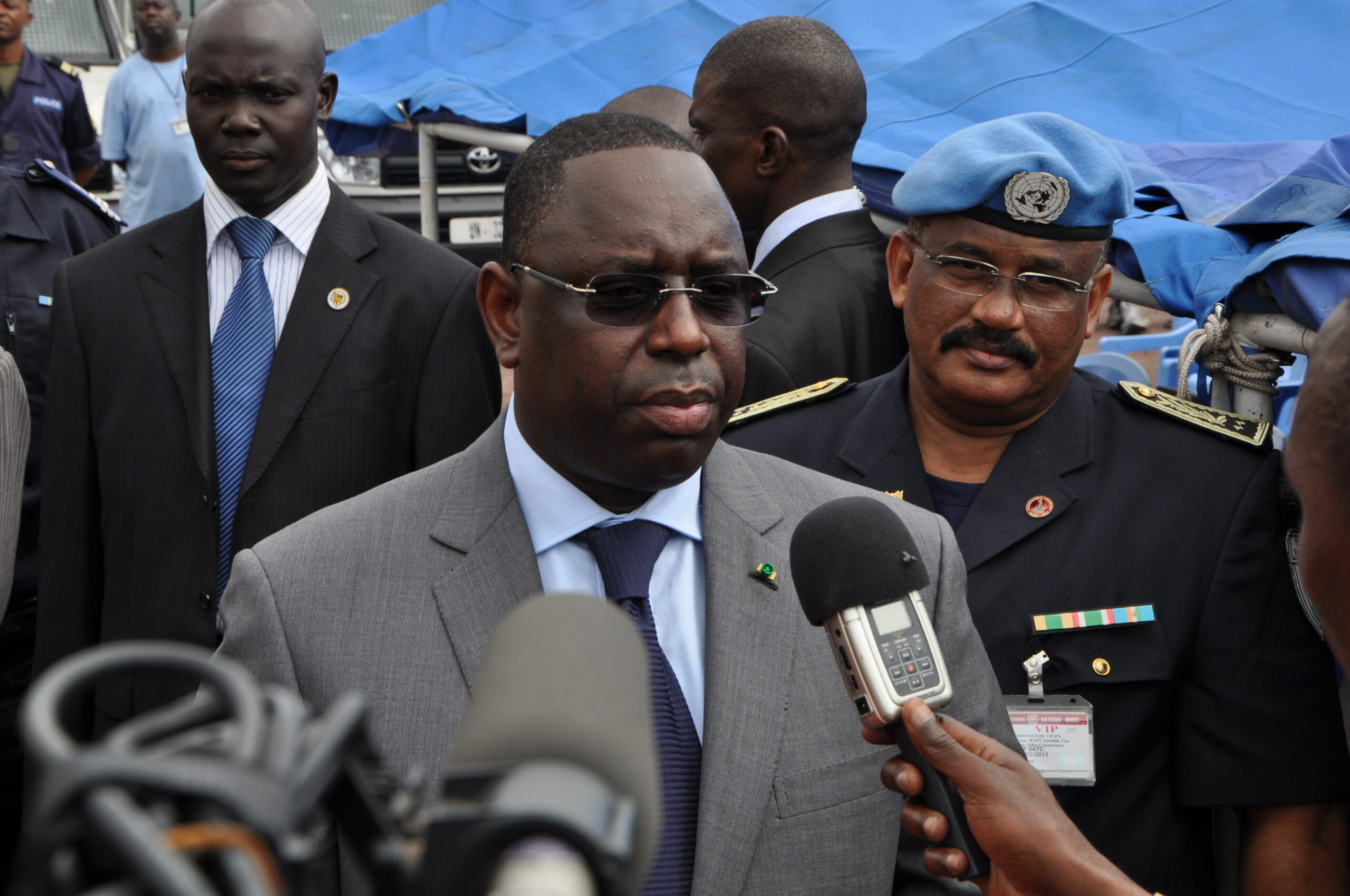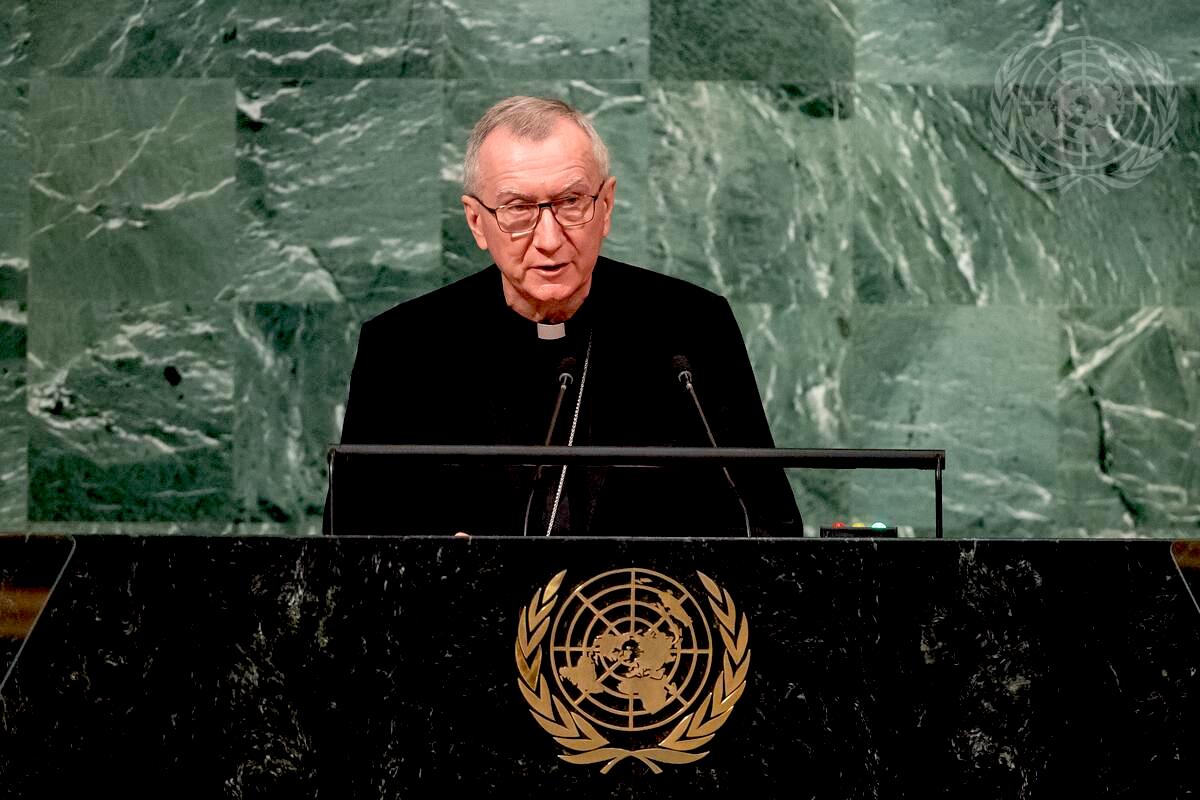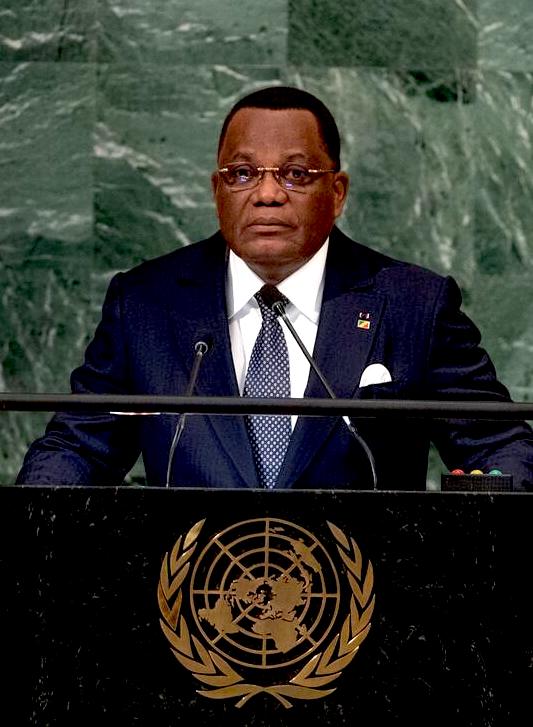“Too much blood has been spilled” — Medea Benjamin and Nicolas J. S. Davies highlight a few of the many under-reported appeals made at the General Assembly for peaceful negotiations.

Ukraine’s President Volodymyr Zelensky, on screens, addresses the U.N. General Assembly, Sept. 21. (U.N. Photo/Cia Pak)
By Medea Benjamin and Nicolas J. S. Davies
Common Dreams

 We have spent the past week reading and listening to speeches by world leaders at the U.N. General Assembly in New York. Most of them condemned Russia’s invasion of Ukraine as a violation of the U.N. Charter and a serious setback for the peaceful world order that is the U.N.’s founding and defining principle.
We have spent the past week reading and listening to speeches by world leaders at the U.N. General Assembly in New York. Most of them condemned Russia’s invasion of Ukraine as a violation of the U.N. Charter and a serious setback for the peaceful world order that is the U.N.’s founding and defining principle.
But what has not been reported in the United States is that leaders from 66 countries, mainly from the Global South, also used their General Assembly speeches to call urgently for diplomacy to end the war in Ukraine through peaceful negotiations, as the U.N. Charter requires. We have compiled excerpts from the speeches of all 66 countries to show the breadth and depth of their appeals, and we highlight a few of them here.
African leaders echoed one of the first speakers, Macky Sall, the president of Senegal, who also spoke in his capacity as the current chairman of the African Union when he said, “We call for de-escalation and a cessation of hostilities in Ukraine, as well as for a negotiated solution, to avoid the catastrophic risk of a potentially global conflict.”

President Macky Sall of Senegal in 2012. (MONUSCO, CC BY-SA 2.0, Wikimedia Commons)
The 66 nations that called for peace in Ukraine make up more than a third of the countries in the world, and they represent most of the Earth’s population, including India,China, Indonesia, Bangladesh, Brazil and Mexico.
While NATO and E.U. countries have rejected peace negotiations, and U.S. and U.K. leaders have actively undermined them, five European countries — Hungary, Malta, Portugal, San Marino and the Vatican — joined the calls for peace at the General Assembly.
Donate to CN’s 2022 Fall Fund Drive
The peace caucus also includes many of the small countries that have the most to lose from the failure of the U.N. system revealed by recent wars in Ukraine and the Greater Middle East, and who have the most to gain by strengthening the U.N. and enforcing the U.N. Charter to protect the weak and restrain the powerful.
Philip Pierre, the prime minister of Saint Lucia, a small island state in the Caribbean, told the General Assembly,
“Articles 2 and 33 of the U.N. Charter are unambiguous in binding Member States to refrain from the threat or use of force against the territorial integrity or political independence of any state and to negotiate and settle all international disputes by peaceful means. …We therefore call upon all parties involved to immediately end the conflict in Ukraine, by undertaking immediate negotiations to permanently settle all disputes in accordance with the principles of the United Nations.”
Global South leaders lamented the breakdown of the U.N. system, not just in the war in Ukraine but throughout decades of war and economic coercion by the United States and its allies. President Jose Ramos-Horta of Timor-Leste directly challenged the West’s double standards, telling Western countries,
“They should pause for a moment to reflect on the glaring contrast in their response to the wars elsewhere where women and children have died by the thousands from wars and starvation. The response to our beloved secretary-general’s cries for help in these situations have not met with equal compassion. As countries in the Global South, we see double standards. Our public opinion does not see the Ukraine war the same way it is seen in the North.”
Many leaders called urgently for an end to the war in Ukraine before it escalates into a nuclear war that would kill billions of people and end human civilization as we know it. The Vatican secretary of state, Cardinal Pietro Parolin, warned,
“…the war in Ukraine not only undermines the nuclear non-proliferation regime, but also presents us with the danger of nuclear devastation, either through escalation or accident. … To avoid a nuclear disaster, it is vital that there be serious engagement to find a peaceful outcome to the conflict.”

The Vatican’s Cardinal Pietro Parolin addresses U.N. General Assembly’s 77th session on Sept. 24. (UN Photo/Laura Jarriel)
Others described the economic impacts already depriving their people of food and basic necessities, and called on all sides, including Ukraine’s Western backers, to return to the negotiating table before the war’s impacts escalate into multiple humanitarian disasters across the Global South. Prime Minister Sheikh Hasina of Bangladesh told the assembly,
“We want the end of the Russia-Ukraine war. Due to sanctions and counter-sanctions, …the entire mankind, including women and children, is punished. Its impact does not remain confined to one country, rather it puts the lives and livelihoods of the people of all nations in greater risk, and infringes their human rights. People are deprived of food, shelter, healthcare and education. Children suffer the most in particular. Their future sinks into darkness.
My urge to the conscience of the world: stop the arms race, stop the war and sanctions. Ensure food, education, healthcare and security of the children. Establish peace.”
Turkey, Mexico and Thailand each offered their own approaches to restarting peace negotiations, while Sheikh Al-Thani, the emir of Qatar, succinctly explained that delaying negotiations will only bring more death and suffering:
“We are fully aware of the complexities of the conflict between Russia and Ukraine, and the international and global dimension to this crisis. However, we still call for an immediate ceasefire and a peaceful settlement, because this is ultimately what will happen regardless of how long this conflict will go on for. Perpetuating the crisis will not change this result. It will only increase the number of casualties, and it will increase the disastrous repercussions on Europe, Russia and the global economy.”
Responding to Western pressure on the Global South to actively support Ukraine’s war effort, India’s Foreign Minister Subrahmanyam Jaishankar claimed the moral high ground and championed diplomacy,
“As the Ukraine conflict continues to rage, we are often asked whose side we are on. And our answer, each time, is straight and honest. India is on the side of peace and will remain firmly there. We are on the side that respects the U.N. Charter and its founding principles. We are on the side that calls for dialogue and diplomacy as the only way out. We are on the side of those struggling to make ends meet, even as they stare at escalating costs of food, fuel and fertilizers.
It is therefore in our collective interest to work constructively, both within the United Nations and outside, in finding an early resolution to this conflict.”
One of the most passionate and eloquent speeches was delivered by Congolese Foreign Minister Jean-Claude Gakosso, who summarized the thoughts of many, and appealed directly to Russia and Ukraine — with parts of his speech in Russian.
Jean-Claude Gakosso, foreign minister of the Republic of Congo, addresses the General Assembly’s 77th session on Sept. 26. (U.N. Photo/Cia Pak)
“Because of the considerable risk of a nuclear disaster for the entire planet, not only those involved in this conflict but also those foreign powers who could influence events by calming them down, should all temper their zeal. They must stop fanning the flames and they must turn their backs on this type of vanity of the powerful which has so far closed the door to dialogue.
Under the auspices of the United Nations, we must all commit without delay to peace negotiations — just, sincere and equitable negotiations. After Waterloo, we know that since the Vienna Congress, all wars finish around the table of negotiation.
The world urgently needs these negotiations to prevent the current confrontations – which are already so devastating – to prevent them from going even further and pushing humanity into what could be an irredeemable cataclysm, a widespread nuclear war beyond the control of the great powers themselves — the war, about which Einstein, the great atomic theorist, said would be the last battle that humans would fight on Earth.
Nelson Mandela, a man of eternal forgiveness, said that peace is a long road, but it has no alternative, it has no price. In reality, the Russians and Ukrainians have no other choice but to take this path, the path of peace.
Moreover, we too should go with them, because we must throughout the world be legions working together in solidarity, and we must be able to impose the unconditional option of peace on the war lobbies.
[Next three paragraphs in Russian]: Now I wish to be direct, and directly address my dear Russian and Ukrainian friends.
Too much blood has been spilled — the sacred blood of your sweet children. It’s time to stop this mass destruction. It’s time to stop this war. The entire world is watching you. It’s time to fight for life, the same way that you courageously and selflessly fought together against the Nazis during World War Two, in particular in Leningrad, Stalingrad, Kursk and Berlin.
Think about the youth of your two countries. Think about the fate of your future generations. The time has come to fight for peace, to fight for them. Please give peace a real chance, today, before it is too late for us all. I humbly ask this of you.”
At the end of the debate on Sept. 26, Csaba Korosi, the president of the General Assembly, acknowledged in his closing statement that ending the war in Ukraine was one of the main messages “reverberating through the hall” at this year’s General Assembly.
[You can read here Korosi’s closing statement and all the calls for peace he was referring to.]
[To join the “legions working together in solidarity… to impose the unconditional option of peace on the war lobbies,” as Jean-Claude Gakosso said, you can learn more at Peace in Ukraine.]
Medea Benjamin, co-founder of Global Exchange and CODEPINK: Women for Peace, is the author of the 2018 book, Inside Iran: The Real History and Politics of the Islamic Republic of Iran. Her previous books include: Kingdom of the Unjust: Behind the U.S.-Saudi Connection(2016); Drone Warfare: Killing by Remote Control (2013); Don’t Be Afraid Gringo: A Honduran Woman Speaks from the Heart (1989) and, with Jodie Evans, Stop the Next War Now (Inner Ocean Action Guide) (2005).
Nicolas J. S. Davies is an independent journalist, a researcher with CODEPINK and the author of Blood On Our Hands: the American Invasion and Destruction of Iraq.
This article is from Common Dreams.
Donate Today to CN’s
2022 Fall Fund Drive
Donate securely by credit card or check by clicking the red button:


The war could have been easily prevented if the UN had listened to the voice of Russia for at least the last two years. Russia and Ukraine could have come to a compromise, but, as always, America interfered in other people’s affairs and ignited this conflict. And Ukraine continued to bomb Russians living in the east, with the support of American curators. There should be a desire in the UN to understand who is the main culprit of the conflict and announce it, but will they be able and willing to do this?
If one looks at history of the breakaway republic Kosovo from Serbia, under Bill Clinton when Russia was incapacitated due to the idealist Gorbachev and the drunken Yeltsin, we see the blueprint for Putin in the Donbas, and for future breakaway republics leaving Ukraine. Recognize the independence and sovereignty of the breakaway nations, invoke Article 51 of the UN Charter for “collective self defense”, have plebiscites to assure the world this is what the new nations’ peoples want, and slaughter people in War for “democracy”.
For eight years Putin and Russia tried to stop the genocide of ethnic Russian Ukrainians through diplomacy and negotiations. VP Biden, now President, sees diplomacy and peace as a weakness, and is determined to “bleed Russia dry”. Neither Poroshenko nor Zelensky, both US puppets who have no real say in US Puppet Ukraine’s future, made any effort to honor their Minsk accords agreements (proctored by Germany and France) with what are now the breakaway nations. The whole point of provoking this war by UkroNAZIs, as Biden has made clear, is to exterminate ethnic Russian Ukrainians and overthrow and Balkanize Russia. Then onward to Iran and China.
Now that we have effectively burned the lifeboats for our nervous German crew members by blowing up their Nord Stream pipeline, is it too late to ask how any of the rest of us might manage to get off this giant American war ship heading toward Russia?
If Captain Joe Biden and his eager staff of Affirmative Action Nimrods, nitwits, and ne’er do wells do not yet make you uneasy, you are just not paying attention with the course we are now on. D*MN!
I agree with India, China and Serbia. The UN Charter should be respected, and the territorial integrity of every member nation should be upheld.
If you are being sarcastic here, then China does not fit in, especially if one accepts that persecution of Uyghur is an entirely domestic Chinese issue !
If you still believe that this Uyghur business wasn’t instigated by the USA as usual, you should look into it.
The only peace America and Nato appear to be after is to gain a bigger piece of global geography and economics. Those who fear this suggest non-war peace is the goal.